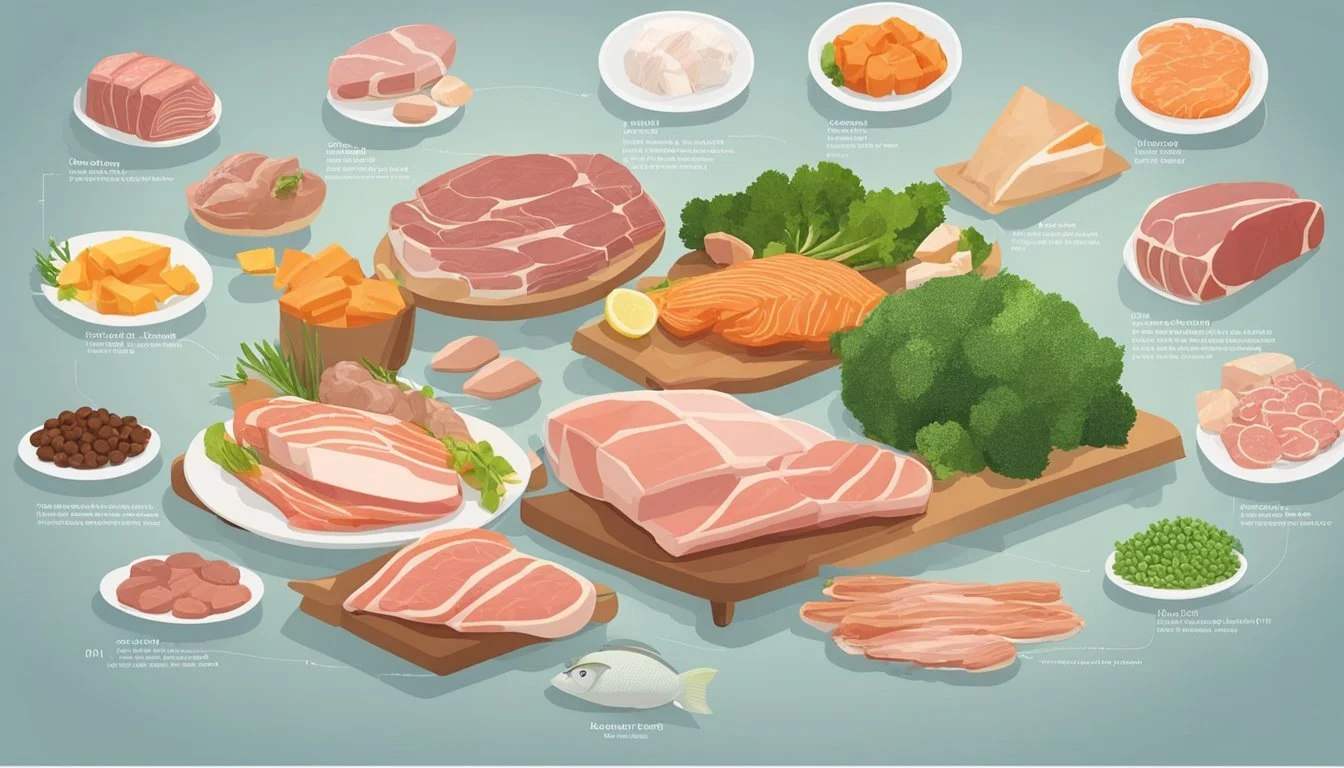Carnivore Diet and Improving the Body's pH Balance
Unveiling the Connection
The Carnivore Diet is a dietary regimen that emphasizes the consumption of exclusively animal products including meat, fish, eggs, and certain dairy products. This approach to eating is gaining traction among those seeking to simplify their diet and is often touted for its potential health benefits. Advocates claim improvements in weight management, mental clarity, and hormonal balance, with some even reporting an enhanced sense of physical well-being.
Addressing the body's pH balance is a concern that often arises when discussing diet and health. The human body naturally regulates its pH level to maintain a slightly alkaline state. Some believe that the foods consumed can influence this balance, with the Carnivore Diet consisting primarily of animal products that are considered to be acidic. The impact of an all-meat diet on the body's pH levels is a topic of ongoing discussion, as the body's ability to maintain homeostasis is complex and multifaceted.
Proponents of the Carnivore Diet argue that the elimination of plant-based foods, which could contain anti-nutrients and irritants, may reduce inflammation and support the body's natural regulatory systems, including pH balance. However, the diet's restriction to primarily acidic foods raises questions about its long-term effects on health, including bone density and kidney function. Research on the diet's direct impact on pH balance and overall health is still evolving.
Fundamentals of the Carnivore Diet
The Carnivore Diet advocates for a way of eating that focuses on animal-based foods exclusively. The diet excludes plant-derived nutrients and emphasizes meat as the primary food source.
Defining the Carnivore Diet
The Carnivore Diet is a restrictive regimen that consists entirely of animal products. Individuals on this diet consume a variety of meats, including beef, pork, lamb, and poultry, as well as fish and other seafood. The inclusion of eggs, dairy products, and specifically organ meats is not only common but encouraged for their nutrient density. Unlike other diets, it eliminates all plant-based foods, which means fruits, vegetables, grains, and nuts are not consumed.
Primary Exclusions:
Fruits & Vegetables
Grains
Legumes
Nuts & Seeds
Historical Context and Evolution
The diet mirrors the eating patterns of ancient hunter-gatherer societies, which relied heavily on animal hunting and fishing. Despite the modern shift towards plant-inclusive diets for health and sustainability reasons, proponents of the Carnivore Diet suggest that a high intake of animal products is aligned with humans' evolutionary dietary requirements. Contemporary adoption of the Carnivore Diet often stems from a desire to simplify eating habits, reduce processed food intake, and in some cases, address specific health concerns.
Key Historical Points:
Reliance on animal hunting and fishing
Alignment with perceived ancestral diets
Modern shift as a response to processed foods and specific health issues
Primary Foods Consumed
The core of the Carnivore Diet is meat. This emphasizes not only muscle meats but also a variety of organ meats—such as liver, kidneys, heart—which are considered nutrient-rich. The diet highlights the importance of including a diverse range of animal products to maintain health. Eggs, which are rich in protein and essential vitamins, are another staple. Low-lactose dairy products are sometimes included, though they may be avoided by those with sensitivities.
Carnivore Diet Staples:
Muscle Meats (beef, lamb, pork, poultry)
Organ Meats (liver, heart, kidneys)
Seafood
Eggs
Certain Dairy Products (particularly low-lactose)
Body pH Balance Explained
The body's pH balance is a critical factor in maintaining overall health, with diet playing a key role in sustaining this balance.
Understanding pH Levels in the Body
The body's pH level refers to the measure of how acidic or alkaline it is, on a scale ranging from 0 (highly acidic) to 14 (highly alkaline). Blood pH is tightly regulated by the body and normally stays within a narrow range of 7.34 to 7.45, which is slightly alkaline.
Water's Role: Water acts as a solvent, helping to remove waste and maintain a stable internal environment, assisting in keeping the pH level balanced.
Health Implications: Deviations from the normal pH range can disrupt metabolic functions and lead to health issues.
Role of Diet in Regulating Body pH
A person's diet can have an effect on the body's pH levels. While the body has mechanisms to maintain a stable pH, dietary choices can influence this balance.
Alkaline-Forming Foods: Fruits and vegetables are typically alkaline-forming and can promote a favorable pH balance.
Acid-Forming Foods: Animal proteins and cheeses tend to be acid-forming and, if consumed in excess, can contribute to a more acidic state.
Maintaining a balanced diet that includes both alkaline and acid-forming foods is important for preserving the body's ideal pH levels.
Nutritional Profile of the Carnivore Diet
The carnivore diet focuses on consuming animal products and excludes plant-based foods, concentrating on protein and fat intake while raising questions about vitamin and mineral consumption.
Macro and Micronutrients
The carnivore diet provides a high intake of protein and fat, specifically saturated fat. It typically includes muscle meats, fish, eggs, and some dairy. Organs such as the liver are valued for their nutrient density. However, the absence of plant foods means a reliance on animal products to meet micronutrient needs.
Protein: Essential for muscle and cellular repair, abundant in all meat products.
Fat: Provides energy; varies in composition (saturated and unsaturated) across different animal products.
Vitamins and Minerals in Carnivore Diet
Animal products like liver and bone broth are rich in certain vitamins and minerals. Liver is a source of Vitamin A, Vitamin B12, and iron. However, the lack of variety potentially impacts the intake of other essential micronutrients.
Vitamin C: Typically found in fruits and vegetables, but organ meats provide smaller amounts.
Vitamin D: Found in fatty fish and can be synthesized by the body in response to sunlight.
For the most extensive selection, I suggest buying vitamin C and vitamin D online!
Assessing Fats and Proteins
Within a carnivore diet, fats and proteins serve as the primary energy sources. Cholesterol levels and types of fats (saturated vs. unsaturated) consumed are important considerations for practitioners of the diet.
Saturated Fat: Common in red meats and can influence cholesterol levels.
Protein: Sufficiently consumed through a variety of animal products.
Potential Nutrient Deficiencies
While emphasizing proteins and fats, the carnivore diet's exclusion of plant foods may lead to deficiencies in certain micronutrients not abundantly available in animal products.
Fiber: Nonexistent in animal products and essential for digestive health.
Certain vitamins (e.g., Vitamin E, K) and minerals (e.g., magnesium, calcium): Predominantly found in plant-based foods and may require supplementation.
Skip the lines and order your vitamin E, vitamin K, magnesium, and calcium online for a stress-free shopping experience!
Health Benefits and Claims
Exploring the carnivore diet reveals various claims surrounding its impact on health. These focus on weight management, blood sugar levels, heart health, and the digestive system. While proponents highlight possible benefits, it is essential to consider these claims in light of current scientific understanding.
Weight Loss and Body Composition
Proponents of the carnivore diet often report weight loss as a significant benefit due to its low-carb nature that may lead to reduced appetite and increased fat metabolism. The diet's emphasis on high-protein intake is thought to support muscle preservation during weight loss.
Impact on Blood Sugar and Diabetes
Adherents suggest that eliminating carbohydrates can lead to stable blood sugar levels, potentially improving the management of diabetes. The near elimination of sugar and refined carbs is said to prevent blood sugar spikes, which could be beneficial for individuals with insulin resistance.
Effects on Heart Health and Cholesterol
Views on the carnivore diet's effects on heart health are mixed. Those in favor cite improvements in HDL (good) cholesterol levels, while critics point to a potential increase in risk for heart disease due to high intake of saturated fats from animal products.
Digestive System and Gut Health
The elimination of plant-based fibers has led to claims of improved digestive system health, positing that meat-only diets reduce inflammation and digestive issues in certain individuals. Critics, however, raise concerns about the long-term implications of forgoing dietary fiber, which is traditionally associated with gut health.
Potential Health Risks and Criticisms
The Carnivore Diet, which emphasizes meat consumption and excludes plant-based foods, has been met with concerns regarding its long-term health risks and lack of essential nutrients found in a more balanced diet.
Concerns Over Excessive Meat Consumption
High Saturated Fat Content: A diet predominantly featuring meat, particularly red and processed meats, tends to be high in saturated fats. Diets rich in saturated fats are associated with higher levels of LDL cholesterol, commonly referred to as 'bad cholesterol.'
Correlation with Heart Disease: High intake of saturated fats has been implicated in the development of heart disease, due to their potential role in clogging arteries and increasing the risk of heart-related events.
Risk of Chronic Diseases
Cancer Risks: Regular consumption of processed meats and red meats has been linked to an increased risk of certain cancers, such as colon cancer, due to compounds formed during processing and cooking.
Inflammation and Oxidants: Although meat can be a rich source of certain nutrients, it lacks antioxidants found in vegetables that help combat inflammation in the body.
Controversy Surrounding Plant Elimination
Lack of Fibers: The exclusion of vegetables and fruits results in a diet deficient in dietary fibers, which are crucial for maintaining gut health and preventing diseases like colon cancer.
Nutritional Deficiencies: Plant-based foods are important sources of vitamins, minerals, and other compounds essential for health. Their exclusion can lead to deficiencies and potential negative health outcomes, highlighting the controversy of eliminating these foods from the diet.
Comparing Diets for pH and Health
When exploring diets for health optimization, the carnivore, keto, and plant-based diets present varied impacts on the body's pH balance. Each diet has distinct food groups that influence whether the body's internal environment becomes more acidic or alkaline.
Carnivore vs. Keto vs. Plant-based Diets
Carnivore Diet: The carnivore diet strictly includes animal-based foods, which can increase the body's acid load, potentially affecting pH balance. It is devoid of fruits and vegetables but rich in protein from meats, including organ meats and dairy products.
Keto Diet: The ketogenic, or keto, diet induces ketosis, a metabolic state wherein the body burns fat for fuel in the absence of carbohydrates. This diet includes plant-based oils, butter, and high-fat dairy, alongside meat, but limits carbohydrate-rich vegetables and fruits.
Plant-based Diet: A plant-based diet emphasizes fruits, vegetables, nuts, seeds, and legumes. These foods are often alkaline-forming and rich in nutrients that may encourage a more balanced pH within the body.
Balancing Body pH with Different Diets
Diets affect the body's pH, which ideally remains slightly alkaline. Misbalanced pH may impact health, and dietary choices contribute to this delicate equilibrium.
Carnivore diet: Composed mainly of acidic animal proteins, it may challenge the body's ability to maintain optimal pH levels without the alkaline influence of plant-based foods.
Keto diet: While also emphasizing animal products, the inclusion of certain vegetables and plant-based oils may offer a more balanced approach to pH compared to a solely carnivorous diet.
Plant-based diet: With an abundance of alkaline-promoting vegetables and fruits, this diet supports a pH that maintains overall health. It's also rich in fiber, which may positively influence digestion and metabolic processes.
Adjusting the Carnivore Diet for pH Balance
When adopting a carnivore diet, one may be concerned about maintaining the body's pH balance. While the impact of diet on blood's pH is minimal, ensuring the inclusion of diverse meats and employing pH-balancing techniques may benefit overall balance and health.
Choosing the Right Types of Meat
The variety of meats in one's diet can influence the body's acidic load. Select meats with care:
Fish such as salmon and mackerel are alkaline-forming and rich in omega-3 fatty acids, potentially contributing to a more favorable pH balance.
Lamb, known for its micronutrient content, including zinc and B vitamins, can be a component of a balanced carnivore diet, consumed in moderation.
Incorporating pH-Balancing Techniques
While the body regulates pH levels tightly, certain techniques may complement a carnivore diet to promote balance:
Hydration: Adequate water intake supports the kidneys in managing the body's acid-base balance.
Breathing exercises: Although indirect, controlled breathing practices may influence how the body regulates pH by affecting the carbon dioxide levels.
Implementing these strategies alongside a carnivorous eating plan can support maintaining the body's pH within healthy ranges.
Lifestyle Considerations and Practical Tips
Adherence to the Carnivore Diet requires thoughtful planning and consideration to maintain balance and health, particularly because it restricts food groups that can affect the body's pH. The following subsections outline strategic practices for meal preparation, social engagements, and nutritional supplementation.
Meal Planning and Prep
Meal planning is crucial for those on the Carnivore Diet to ensure they receive adequate nutrients while attempting to improve their body's pH balance. Meal prep should include a diverse selection of animal proteins and possibly the inclusion of low-lactose dairy products:
Breakfast: Eggs and bacon are standard; consider rotating different meats to prevent nutrient deficiencies.
Lunch and Dinner: Opt for a mix of fatty cuts like ribeye and leaner proteins such as chicken or turkey. Encourage organ meat consumption several times a week for nutrient density.
Hydration is equally important; individuals should drink plenty of water to counterbalance the high protein intake and aid in pH balance.
Navigating Social Settings and Dining Out
Social settings can pose challenges for those following strict diets. When dining out:
Request: Simply prepared meat dishes, such as grilled or steamed, without added sauces or breading that might contain hidden carbs or sugars.
Communicate: Let the host or restaurant know of dietary preferences to accommodate the diet's needs.
Supplements and Supporting Nutrients
To counter potential nutrient shortfalls, particularly fiber, certain supplements may be necessary:
Electrolytes: To maintain energy levels and prevent constipation, supplementing with magnesium, sodium, and potassium can be helpful.
Bone Broth: High in minerals that support pH balance, bone broth can be a beneficial addition.
Fiber: Although the carnivore diet typically excludes fiber, individuals concerned with maintaining a healthy gut may consider a fiber supplement, if appropriate.
Regular monitoring by a healthcare provider is recommended, as the individual may require adjustments to their diet or supplements to ensure optimal health and maintain the body's pH balance.













